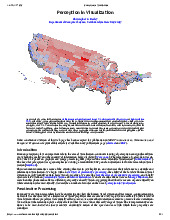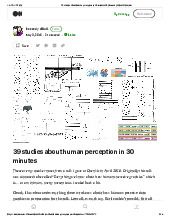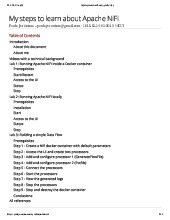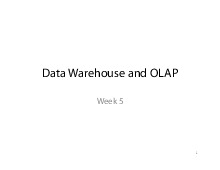



















Preview text:
Building Robust Data Pipelines with May 2019 Who am I
● Software Engineer – Databricks
- “We make your streams come true” ● Apache Spark Committer
● MS in Management Science & Engineering - Stanford University
● BS in Mechanical Engineering - Bogazici University, Istanbul
Today, we’re going to ride a time machine Let’s go back to 2014…
Evolution of Data Pipelines @ Databricks Circa MMXIV Deployment Deployment Deployment Amazon S3 Deployment S3-copy Batch Job Every Hour* Data Pipeline V1
• Took 1 engineer ~1 week to implement
• Was pretty robust for the early days of Databricks
• … until we got to 30+ customers
• File listing on S3 quickly became the bottleneck
• *eventually, job duration rose to 8 hours Fast-forward to 2016…
Evolution of Data Pipelines @ Databricks Circa 2016 Deployment Deployment Deployment
Amazon Kinesis Stream Continuously Deployment Compact Once a day Data Pipeline V2 • Scaled very well
• ETL’ing the data became fast • Took 2 engineers ~8 months
• Query performance / experience got worse • Lots of small files •
Compaction jobs impacted queries (FileNotFoundExceptions) •
HiveMetaStore quickly became bottleneck •
REFRESH TABLE / MSCK REPAIR TABLE / ALTER TABLE ADD PARTITIONS
• Logic became more complicated. Pipeline was less robust
• Fixing mistakes in the data became harder What Happened? Examples of Data Mistakes
• A field’s unit changed from MB to GB
• Schema inference / mismatch •
An integer column in JSON started getting inferred as longs after
Spark upgrade. Some Parquet files had ints, some had longs •
A different type of log got introduced to the system. All of a sudden a
table with 8 columns had 32 new columns introduced •
A Json column was written with two different cases: “Event” instead of
“event”. Parquet failed to read the written values for “Event” anymore
• Garbage data caused by partial failures Problems in Data Pipelines • Correctness •
Lack of atomicity leads to pockets of duplicate data •
Bookkeeping of what to process is tedious – late / out-of-order data • Schema Management •
Maintaining Data Hygiene – checks/corrections • Performance •
Listing files on blob storage systems is slow •
Lots of small files hurt query performance •
HiveMetaStore experience is horrendous – Doesn’t scale well –
Having to call MSCK REPAIR TABLE and REFRESH TABLE all the time Enter Delta Lake
• Designed for Data Lake Architectures
• No lock-in – Data in open Parquet format
• No dependency on HiveMetaStore – Manages metadata internally
• Scales to Billions of partitions and/or files
• Supports Batch/Stream Reads/Writes • ACID Transactions • Schema Enforcement
• Tables Auto-Update and provide Snapshot Isolation
• Query old versions of your table: Time Travel Data Pipelines @ Databricks Streaming Analytics Reporting Event Based Bronze Tables Silver Tables Gold Tables
Properties of Bronze/Silver/Gold • Bronze tables • No data processing •
Deduplication + JSON => Parquet conversion •
Data kept around for a couple weeks in order to fix mistakes just in case • Silver tables • Directly queryable tables • PII masking/redaction • Gold tables •
Materialized/Summary views of silver tables •
Curated tables by the Data Science team
Correctness Problems in Data Pipelines
• Lack of atomicity leads to pockets of duplicate data •
Delta provides ACID transactions and Snapshot Isolation
• Bookkeeping of what to process is tedious – late / out-of-order data •
Structured Streaming handles this. Streaming into Delta provides exactly- once semantics • Schema Management •
Delta manages the schema of the table internally and allows “safe” (opt- in) evolutions
• Maintaining Data Hygiene – checks/corrections •
Delta supports DELETE / UPDATE to delete/fix records (coming soon to OSS) •
Delta supports Invariants (NOT NULL, enum in (‘A’, ‘B’, ‘C’))
Performance Problems in Data Pipelines
• Listing files on blob storage systems is slow •
Delta doesn’t need to list files. It keeps file information in its state
• Lots of small files hurt query performance •
Delta’s OPTIMIZE method compacts data without affecting in-flight queries
• HiveMetaStore experience is horrendous •
Delta uses Spark jobs to compute its state, therefore metadata is scalable! •
Delta auto-updates tables, therefore you don’t need REFRESH TABLE /
MSCK REPAIR TABLE / ALTER TABLE ADD PARTITIONS, etc
Get Started with Delta using Spark APIs Instead of parquet... … simply say delta CREATE TABLE ... CREATE TABLE ... USING delta USING parquet … ... dataframe dataframe .write .write .format("delta") .format("parquet") .save("/data") .save("/data") Tutorial Notebook at:
https://docs.delta.io/notebooks/sais19-tutorial.ipynb
https://docs.delta.io/notebooks/sais19-tutorial.dbc Roadmap for Delta Lake
• Support for AWS S3 and Microsoft Azure File Systems
• Scala APIs for DELETE / UPDATE / MERGE
• Support for VACUUM and CONVERT TO DELTA • Expectations / Invariants




